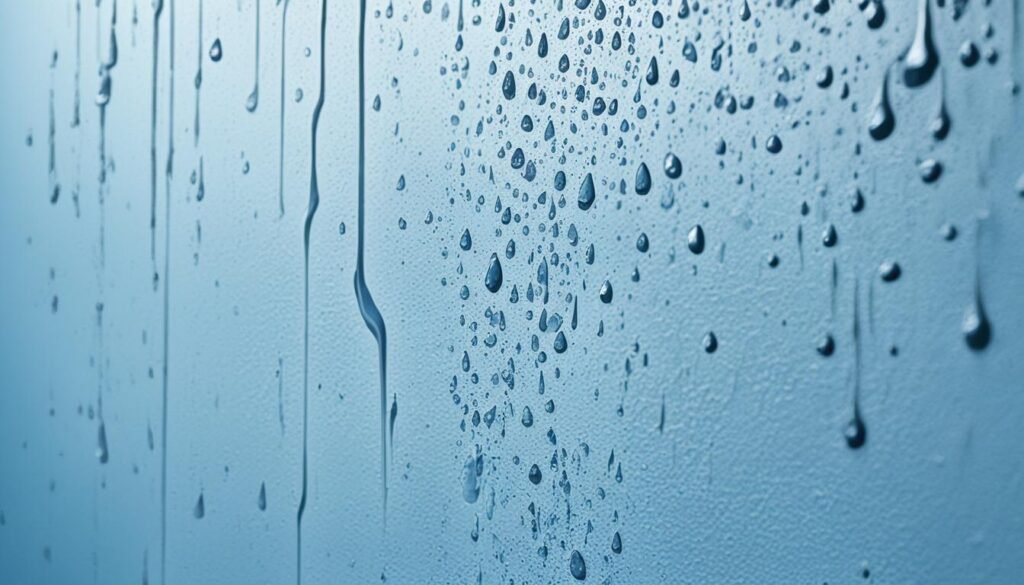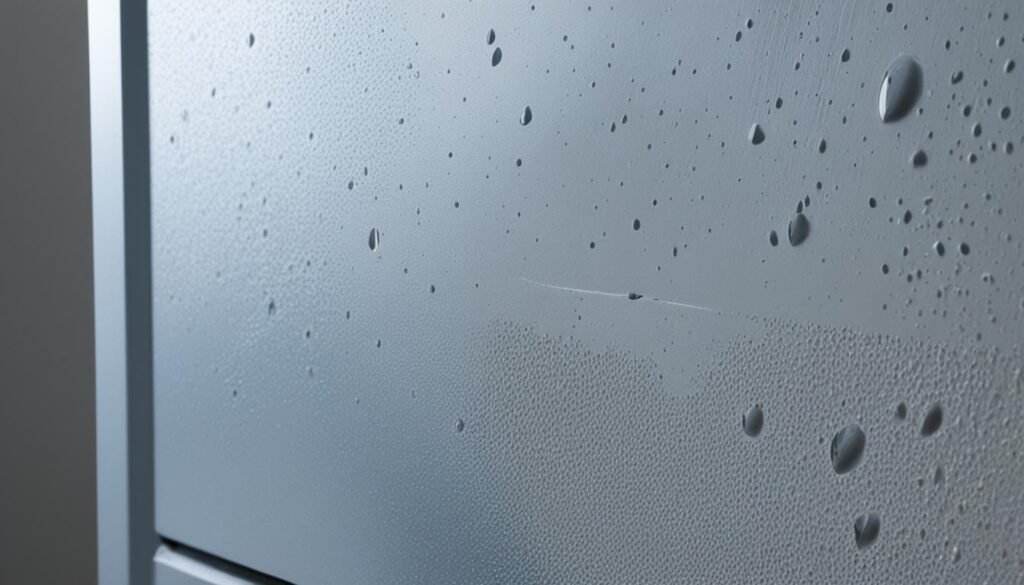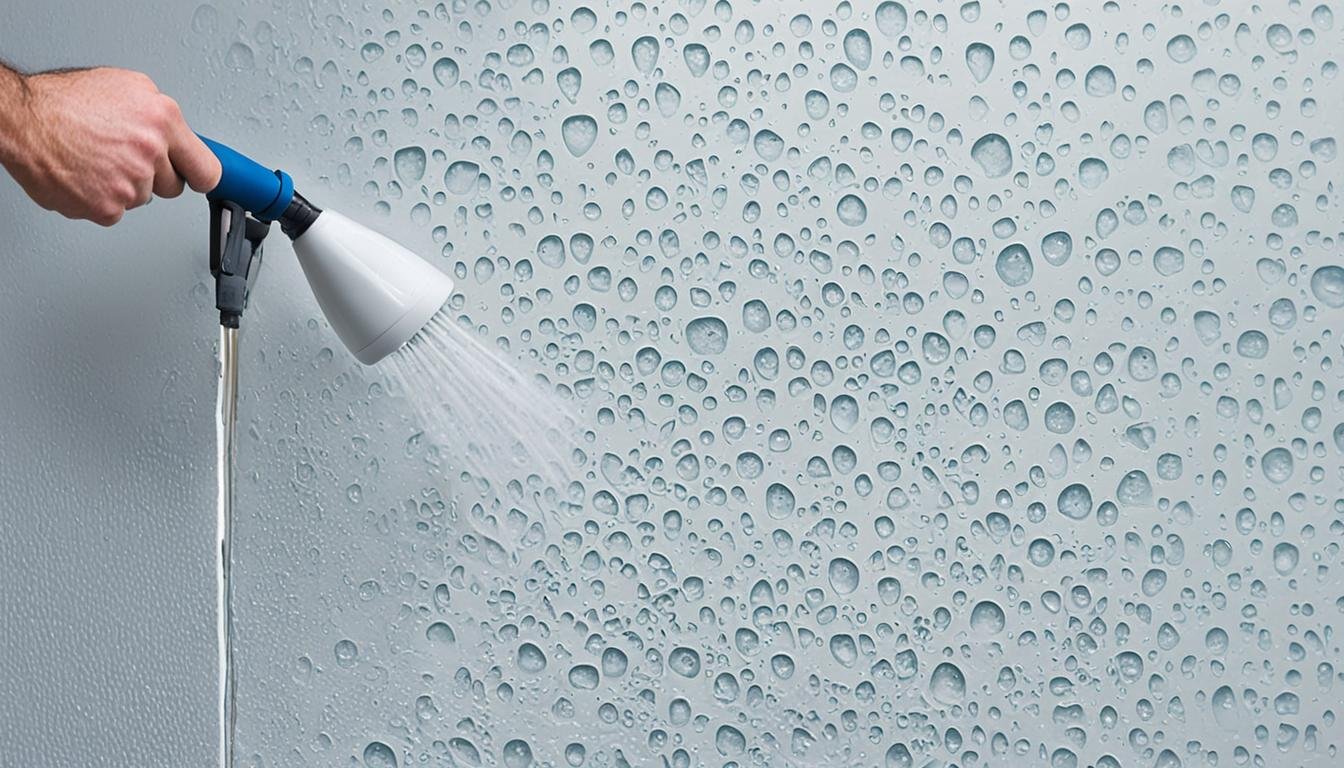Drywall can absorb water up to 30 inches high. This means it’s vital to remove moisture quickly in case of water damage. Water in walls can cause many issues, from bending walls to growing mold. The experts at Water Damage Pros – San Bernardino know the best ways to pull the moisture out. They use advanced tools to keep your home safe.
When water gets into your walls, the drywall can soak up a lot. This sets up the perfect condition for mold and mildew to start growing. The team at Water Damage Pros – San Bernardino doesn’t wait. They use big fans and special cameras to spot and stop water damage early. This fast response helps prevent bigger, more expensive problems later on.
Key Takeaways
- Drywall can wick water up to 30 inches, requiring prompt moisture extraction
- Specialized equipment, such as air movers and infrared cameras, are used to efficiently dry walls
- Moisture barriers like paints and wall coverings can hinder proper drying and lead to mold growth
- Continuous monitoring of the drying process ensures equipment is functioning correctly
- Inner-wall drying systems are often the best and fastest solution for water-damaged walls
Understanding Wall Moisture and Its Consequences
Moisture getting into walls can cause a lot of trouble. It can cause stains, chipping, mold, and make the structure weaker. It’s key to know how water gets into walls and see the signs of damage so we can deal with it.
How Water Saturates Drywall
Ground water in a room first soaks the floor and then moves up the wall. This happens because of capillary action. Drywall can soak up water up to 30 inches high. And the inside of walls may be wetter than the outside. This can happen even if you don’t see any water damage. So, getting a professional to look at it is very important.
Signs of Moisture Damage in Walls
Some signs of water damage are easy to spot. But, some are hidden. This is why a pro needs to inspect your walls. Signs that your walls need serious work due to water include:
- Black patches or streaks on the plaster
- Warped wood
- Cracks or blisters on wallpaper
- Rusted spots on metal stud walls
- Dissolved, chipped, or bowed spots on brick or stone
If you see these signs, it means moisture levels are high. It can cause mold and make the wall structure weak. You must act fast to avoid more damage and cost.
“According to a 2013 Durability + Design Magazine article, a crack that is 20 mils wide and 3 feet long provides the same area for water infiltration as a one-inch diameter hole.”
Using good moisture removal and humidity management strategies is crucial. They help deal with the main causes of wall moisture. This stops the need for expensive wall repairs.

Extracting Moisture from Walls
Dealing with water damage requires quick and effective moisture extraction from walls. The team at Water Damage Pros – San Bernardino uses special gear and methods. This ensures walls are thoroughly dried to stop more damage and prevent mold.
The team uses a non-invasive moisture meter to find hidden wet spots in walls. Infrared cameras help them locate moist areas not seen by the human eye.
They then use high-capacity air movers and dehumidifiers to pull moisture from the walls. These devices work constantly and are checked daily to make sure the walls become completely dry.
The experts also check the Vapor Barrier Installation and adjust the drying plan as needed. This careful step helps ensure the walls dry without harming the structure or the moisture barriers.
The Wall Dehumidification and Moisture Removal Techniques are key for a successful Drywall Restoration. They solve the main moisture issue, reducing the chance of more damage. This approach provides a lasting fix for property owners.
“Timely professional water extraction services are vital in mitigating structural damage and the risk of mold growth.”
Thorough Water Damage Pros services, such as Wall Dehumidification and Moisture Removal Techniques, are vital for full restoration. By working with Water Damage Pros – San Bernardino, home and business owners can be sure their walls will be well-dried and preserved. This protects the long-term condition of their property.

Conclusion
It’s vital to deal with moisture in walls to stop damage and mold. Homeowners can start drying walls on their own. But, it’s smart to get help from pros. Choose experts like Water Damage Pros – San Bernardino. They know how to dry your walls right. They have the right tools and skills for the job. This way, they can get the moisture out fast. They’ll make sure your home is safe and dry again.
Moisture has a big impact on our homes. It comes from many sources and can cause mold if not handled quickly. To keep your space healthy, make sure it’s well-ventilated and use a dehumidifier. After water damage, fast action is key. The right pros will tackle moisture problems in your walls well. They’ll protect your home and your family’s health.
Being smart about moisture in your walls can keep your home strong and safe. No matter if it’s a big or small issue, acting fast is important. Get the moisture out and fix your walls. This step protects your home’s value and your family’s health.
FAQ
How can I tell if my walls have moisture damage?
Why is it important to quickly dry out wet walls?
What equipment and techniques do professionals use to extract moisture from walls?
How long does the drying process typically take?
When should I call in a professional for wall moisture issues?
Source Links
- https://www.puroclean.com/blog/how-do-i-dry-out-walls-after-water-damage/
- https://www.envirovent.com/blog/14-ways-to-help-reduce-condensation-in-your-property/
- https://www.servicemasterrestore.com/residential/water-damage/drying-and-dehumidification/
- https://extension.umn.edu/moisture-and-mold-indoors/moisture-basements-causes-and-solutions
- https://kta.com/kta-university/mitigating-moisture-concrete-walls/
- https://www.humitat-stop.com/en/moisture-in-walls
- https://www.homestargroup.net/restoration-tips/water-extraction-importance
- https://titanrebuild.com/water-extraction/
- https://www.puroclean.com/scottsdale-az-puroclean-restoration-specialists/blog/what-is-water-extraction/
- https://www.labenvironex.com/en/environment/bacteria-and-mould-analyses/moisture-sources-in-houses/
- https://www.servicemasterrestore.com/blog/water-damage/what-is-water-extraction-/
- https://www.foamglas.com/en/advice-center/general-advice/does-my-wall-have-to-breath,-q-,-breathing-walls-and-the-history-behind


